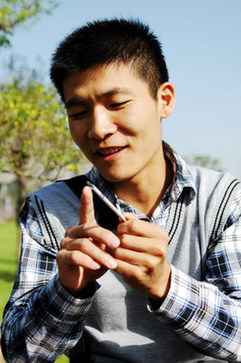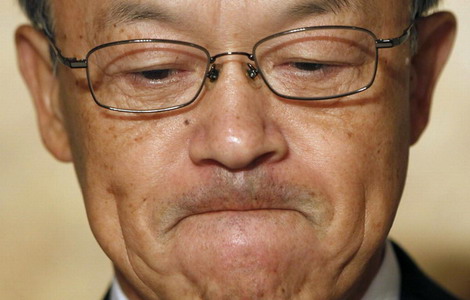Desperately seeking refills
Updated: 2011-10-27 08:24
By Liu Xiangrui and Yang Xiaonan (China Daily)
|
|||||||||||
|
 College student Dong Yufei from Yanshi, Henan province, has collected more than 150,000 used ink pen refills. [Photo by Xiang Mingchao/China Daily]
|
Dong Yufei was.
"I'm battling to find a way to dispose of them and avoid pollution," said the 21-year-old student of architecture in Zhengzhou of Henan province.
He has collected more than 150,000 refills since last July.
The slim young man always carries a notebook in his old black backpack, in which he jots down contacts of students and teachers willing to collect and regularly donate used refills to him.
He came up with the idea after he took the college entrance examinations last June. He noticed that many students, himself included, just threw away empty refills after the examinations.
He made a quick calculation.
"I would chuck away about 100 refills each year if I used up one in three days. The several thousand students in my school would consume hundreds of thousands in a year. Then how about our city, or our province?"
He learned that refills contain pollutants including volatile substances, ink and plastics that cannot fully break down if not recycled.
"Without recycling, numberless waste refills will cause great pollution," said Dong, who decided to collect enough of them so that at least the plastic refill tubes could be recycled.
With 30 copies of printed environmental protection materials, he soon made his first attempt in a high school close to his home in Yanshi, Henan.
But before he had collected anything he was asked to leave by several teachers, who thought he was a refill dealer.
"They even forced me to apologize to the whole class for my interruption," Dong recalled, with a slightly trembling voice.
"It was humiliating."
Dong's parents, who earn less than 2,000 yuan ($315) every month from heavy farm work, cobbled together 7,000 yuan for his college studies. After paying tuition, only about 2,000 yuan was left.
Dong decided to make the most of the money and started collecting old refills in exchange for new ones - 13 used for one new.
He bought 10 boxes of about 2,400 refills from a wholesale market and printed a whole bundle of publicity materials.
"I waited outside secondary and high schools until the classes were over at noon," said Dong.
However, he often received cold stares. Some students' first reaction was "he's a pen dealer", and others supposed he was up to no good.
Collecting refills had left Dong under great financial pressure. To save money, his monthly spending is no more than 150 yuan and sometimes he has only one meal a day.
Besides receiving limited contributions from fellow students, he decided to sell small items on campus in his spare time.
"It helps a little nevertheless, and allows me to buy a few more new refills," Dong said.
His girlfriend Huo Duoduo said, "He'd rather spend his money on buying refills than food. I suggested he quit his collecting, but he insisted that he shouldn't stop it half way."
Dong's parents have been strongly against his collecting of refills, because they want him to focus on studies so that he can find a good job in the future, Dong said.
"I don't have the courage to tell them that I did this at my own cost," said Dong.
Despite all the difficulties, Dong said his consciousness of environmental protection has improved along with his devotion.
After his story appeared in the media in March, many joined his efforts.
"I surfed the Internet and learned that refills really cause pollution," said Liu Yunna, a high school student in Zhengzhou who brought Dong about 10,000 refills she and her classmates have collected.
"Dong's devotion is meaningful, and everybody should make his or her own contribution to environment protection," she said.
However, none of the pen factories Dong approached would recycle the used refills he has collected.
"People think they are useless," said Dong, adding that there is no scientific method to recycle refills yet.
He has done quite a few experiments himself. For example, he once tried to remove ink from the tubes with needles so that they could be recycled separately. But the results were not satisfying at all.
Dong has been contacting more pen manufacturers.
"There's got to be a solution in the future. I've come this far, and I won't give up," he said.
Hot Topics
New sex education textbooks were introduced to pupils in Shanghai on Monday after numerous debates on early-age sex education in China.
Editor's Picks

|

|

|

|

|

|







